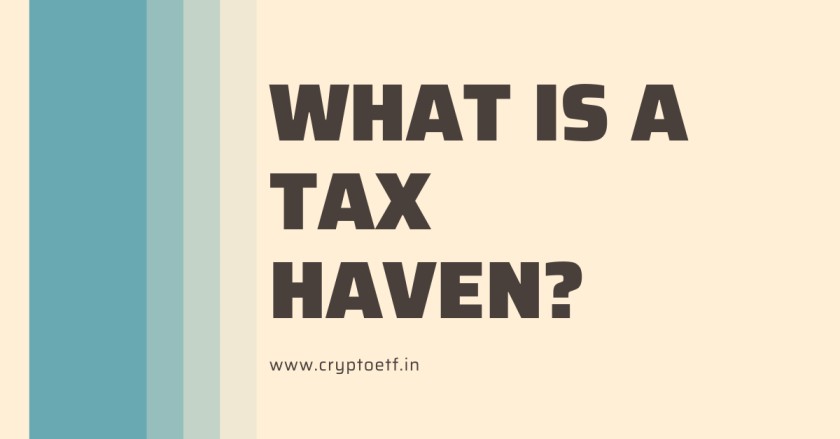A tax haven is a jurisdiction that has low or no taxes, making it appealing to individuals or businesses looking to reduce their tax burden. These jurisdictions frequently have lax or opaque banking laws, making it difficult for tax authorities in other countries to obtain information about financial assets held in the tax haven. Bermuda, the British Virgin Islands, and the Cayman Islands are examples of tax havens. While some individuals and businesses legitimately use tax havens to reduce their tax burden, they have also been used to facilitate tax evasion and money laundering.
Let us now take a closer look at Tax Havens, including the top Tax Haven countries along with the advantages of Tax Havens.
Tax Haven Definition
The tax haven meaning as referred to in the Oxford Dictionary is “a country or independent area where taxes are levied at a low rate.”
What is a Tax Haven?
A tax haven is a country that has low or no taxes and a high level of financial secrecy. Individuals and businesses frequently use tax havens to reduce their tax burden by transferring assets or income to these jurisdictions. Low or no taxes, lenient or secretive banking laws, and a lack of transparency in financial transactions are all common characteristics of tax havens. Bermuda, the British Virgin Islands, and the Cayman Islands are well-known tax havens. While some individuals and businesses use tax havens for legitimate reasons, they have also been used to facilitate tax evasion and money laundering.
Tax Havens provide tax breaks without requiring businesses or residents to operate outside of their borders. As a result, Tax Havens are places with clearly defined geographic jurisdictions that purposefully enact laws to facilitate transactions involving people from outside the jurisdiction.
A legal veil of secrecy is provided in order to make identifying the beneficiaries difficult, with the goal of avoiding taxation or regulation.
Individuals and institutions both use tax havens. Although they both use it to reduce their tax obligations and the methods are similar, their motivations differ slightly, and they use offshore trusts and companies to do so.
There are numerous Tax Havens around the world. Some are independent nations, as we will see below, while others are territories or parts of other nations.
Advantages of Tax Havens
Some of the significant advantages of Tax Havens are listed below-
- Low or no taxes: One of the main reasons people and businesses use tax havens is to avoid paying taxes. This allows them to keep more of their earnings or profits instead of paying a higher tax rate in their home country.
- Confidentiality: Tax havens frequently have strict financial secrecy laws, which can protect individuals’ and businesses’ privacy. Those who want to keep their financial affairs private may find this appealing.
- Ease of incorporation: Starting a business in a tax haven may be faster and easier than in other countries, which may appeal to entrepreneurs.
- Political stability: Because some tax havens are located in politically stable countries, they may be appealing to those looking to protect their assets from political instability or unrest in their home country.
- Access to global financial markets: Tax havens frequently have strong connections to global financial markets, which can be beneficial for businesses seeking capital or expanding their operations.
Disadvantages of Tax Havens
Tax Havens, like any other subject, have some drawbacks, which are detailed below-
- Reputation: The use of tax havens can be contentious and is often viewed negatively by the general public and governments. This can harm a company’s reputation and make doing business more difficult.
- Legal risks: Using a tax haven may be illegal in certain circumstances, such as when it is used to evade taxes or launder money. This could lead to legal issues and fines.
- Limited access to services: Tax havens may have limited access to financial and other services, making doing business more difficult.
- Complexity: Using tax havens can entail complex legal and financial arrangements that can be difficult to navigate and may necessitate the assistance of specialised advisors.
- Control loss: Moving assets or income to a tax haven can result in a loss of control over those assets, which can be dangerous.
Top Tax Haven Countries List
In nations regarded as Tax Havens, there are no income taxes. There are some regions of the world where even wealthy citizens are exempt from paying any income tax.
The 16 largest Tax Havens around the globe are listed below-
1) The Cayman Islands
The Cayman Islands are widely regarded as the world’s most effective tax haven, and they are a popular choice for both businesses and financiers. This country currently has no corporate taxes, which is a wonderful benefit that corporate entities take advantage of to avoid paying heavy and higher taxes.
2) Bermuda
Bermuda is a beautiful island with no income tax and a 0% tax rate, making it an excellent choice for investors and those looking for an offshore location. Bermuda places one of the world’s best emphasises on bankers’ confidentiality.
3) Singapore
Corporate taxes are regarded as low-level in this wealthy and powerful country. Singapore is a thriving economic powerhouse with a GDP of more than a trillion dollars. Singapore allows investors and businesses to pay lower taxes because it is the regional economic and commercial hub.
4) Switzerland
The Swiss are perhaps best known for their efficient and useful financial institutions, which have remained neutral during times of conflict. When it comes to Tax Havens located abroad, the country is well-known for consistently being dependable. It is popular among Europeans and clients from other countries.
5) Netherlands
Netherlands is consistently ranked as one of the most well-known Tax Havens for Fortune 500 corporations. The Netherlands appears to have a significantly lower tax rate in comparison to other European countries, despite not always being openly tax-free like the other Tax Havens on the list.
6) Mauritius
Because of its extreme isolation, it is not surprising that Mauritius, an island nation in the Indian Ocean, has developed into a Tax Haven. The vast majority of Indian companies take advantage of this tax break. While there is a corporate tax in Mauritius, businesses with headquarters in the United States or Europe can take advantage of special tax laws.
7) The Bahamas
With no taxes of any kind, the Bahamas in the Caribbean is the ideal location for any corporation. It is a huge boon for illustrious businesses.
8) Malta
Malta, a tiny island nation, has the EU’s lowest tax burden. Malta is better suited to businesses than to individuals, and businesses are drawn to collaborate with this island nation due to its favourable reputation.
9) Luxembourg
Apart from being one of the richest countries in the world, Luxembourg has long been regarded as a popular Tax Haven. Despite recent EU efforts to tarnish the country’s international reputation as a tax haven, it remains a financial powerhouse.
10) Isle of Man
The Isle of Man, located in the Irish Sea between Ireland and Great Britain, has permissive tax laws that do not impose capital gains or inheritance taxes. Investing in this Tax Haven has exciting benefits, especially for those with pensions who can keep their money intact.
11) Jersey
Jersey is a small island off the coast of France in the English Channel. It is a Crown dependency, which means it is not a part of the United Kingdom but is self-governing and has close ties with the country. Jersey is frequently regarded as a tax haven due to its low corporate tax rate and high level of financial secrecy. The island is home to a number of banks, investment funds, and other financial institutions, and it is a popular location for the formation of offshore trusts and companies. While Jersey is frequently referred to as a tax haven, it has also worked to improve transparency and implement measures to combat money laundering and tax evasion.
12) Guernsey
Guernsey is a small island off the coast of France in the English Channel. It is a Crown dependency, which means it is not a part of the United Kingdom but is self-governing and has close ties with the country. Guernsey is frequently referred to as a tax haven due to its low corporate tax rate and high level of financial secrecy. The island is home to a number of banks, investment funds, and other financial institutions, and it is a popular location for the formation of offshore trusts and companies. While Guernsey is frequently referred to as a tax haven, it has also worked to improve transparency and implement measures to combat money laundering and tax evasion.
13) Gibraltar
Gibraltar is a small territory on Spain’s southern coast. It is a British Overseas Territory with considerable autonomy. Gibraltar is frequently referred to as a tax haven due to its low corporate tax rate and high level of financial secrecy. The territory is home to a number of banks, investment funds, and other financial institutions, and it is a popular location for the formation of offshore trusts and companies. While Gibraltar is frequently referred to as a tax haven, it has also worked to improve transparency and implement measures to combat money laundering and tax evasion.
14) Seychelles
The Seychelles are a group of 115 islands in the Indian Ocean off the coast of East Africa. It is a small, developing country with a growing economy. The Seychelles is sometimes referred to as a tax haven due to its low corporate tax rate and high level of financial secrecy. The country is home to a number of offshore banks, investment funds, and other financial institutions, and it is a popular location for the formation of offshore trusts and companies. While the Seychelles is sometimes regarded as a tax haven, it has also worked to improve transparency and implement anti-money laundering and anti-tax evasion measures.
15) Panama
Panama is a country in Central America located between Costa Rica and Colombia. It is well-known for its canal, which serves as a vital shipping route. Panama is sometimes referred to as a tax haven due to its low corporate tax rate and high level of financial secrecy. The country is home to a number of offshore banks, investment funds, and other financial institutions, and it is a popular location for the formation of offshore trusts and companies. While Panama is sometimes regarded as a tax haven, it has also worked to improve transparency and put in place measures to combat money laundering and tax evasion.
16) Monaco
Monaco is a small city-state on the Mediterranean coast between France and Italy. It is well-known for its high-end real estate and luxury lifestyle. Monaco is sometimes referred to as a tax haven due to its low corporate tax rate and high level of financial secrecy. The country is home to a number of offshore banks, investment funds, and other financial institutions, and it is a popular location for the formation of offshore trusts and companies. While Monaco is sometimes regarded as a tax haven, it has also worked to improve transparency and put in place measures to combat money laundering and tax evasion.
Conclusion
The presence of Tax Havens has numerous consequences. One way to look at it is that countries with no or low taxes put pressure on other countries to keep their taxes low. The short-term benefits for taxpayers outweigh the potential long-term harm to the global economy from money laundering and other illegal activities encouraged by the secrecy and opacity of some Tax Havens.
As evidenced by actions taken against tax evaders in some countries, taxpayers should exercise caution.

Naren is a finance graduate who is passionate about cryptocurrency and blockchain technology. He demonstrates his expertise in these subjects by writing for cryptoetf.in. Thanks to his finance background, he is able to write effectively about cryptocurrency.
